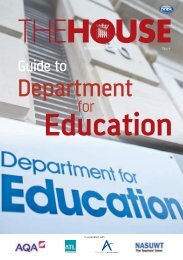Oracy
2fcBkno
2fcBkno
You also want an ePaper? Increase the reach of your titles
YUMPU automatically turns print PDFs into web optimized ePapers that Google loves.
Should oracy be embedded across the curriculum or<br />
taught discretely?<br />
Teachers overwhelmingly feel oracy should form part of regular teaching, rather than be taught as a<br />
separate topic or extra-curricular activity. xxxi This view was significantly more common amongst primary<br />
and secondary teachers than post-16 of FE teachers although over three quarters of post-16 and FE<br />
teachers also believe this.<br />
How should oracy be taught? 906<br />
Mainly in the classroom, as a discrete subject or<br />
topic<br />
Mainly Mainly the classroom, in the classroom, a discrete as part subject of a regular or subject<br />
topic teaching<br />
83%<br />
83%<br />
8%<br />
Mainly Mainly the classroom, an extra-curricular as part of a activity, regular in subject addition to<br />
teaching classroom teaching<br />
Mainly as an extra-curricular activity, in addition to<br />
Don’t know<br />
classroom teaching<br />
Don’t know<br />
Mainly as an extra-curricular activity, rather than in<br />
the classroom<br />
1%<br />
1%<br />
4%<br />
1% 3%<br />
1%<br />
4%<br />
8%<br />
3%<br />
Mainly as an extra-curricular activity, rather than in<br />
the classroom<br />
None of these<br />
None of these<br />
Teachers’ rationale for this approach is<br />
that oracy is both a ‘generic’ process that<br />
underpins good teaching and learning,<br />
but also because specific spoken<br />
language matters in different subjects<br />
in different ways:<br />
“I don’t know I would want to send them to classes in<br />
[oracy]. I would prefer it’s in every lesson. So if you’re<br />
doing a science lesson now, what the science teacher<br />
is doing is [saying] ‘I want you to talk like a scientist’.<br />
<strong>Oracy</strong> is then underpinning my responsibility as a<br />
science teacher [to make] you speak like a scientist,<br />
read like a scientist, and write like a scientist”<br />
Geoff Barton, Headteacher, King Edward VI School<br />
Some schools, though, feel that teaching<br />
oracy discretely helps meet the needs of<br />
their pupils more effectively. St Ambrose<br />
Barlow RC High School began trialling a<br />
discrete oracy curriculum with its 2016/17<br />
year 7 cohort as part of an Education<br />
Endowment Foundation (EEF) funded trial<br />
of the Voice 21 and University of Cambridge<br />
<strong>Oracy</strong> Framework. 134 Bec Tulloch who<br />
teaches there feels that:<br />
“The kids that we’re picking up in Salford, they need<br />
us to do that, they need to have that space and time<br />
where we make it part of the culture of the school.<br />
If you ask me in ten years … ‘does this school need<br />
that?’ then maybe we’ll be in a different place … but<br />
from the point we’re starting at where our students<br />
have such a weakness that we have noticed and<br />
acknowledged, we have to do something about that”<br />
Bec Tulloch, Drama Teacher St Ambrose Barlow RC<br />
52<br />
xxxi<br />
Practitioners were asked how they thought oracy should be taught, with oracy defined as ‘the development of children’s capacity to<br />
use speech to express their thoughts and communicate with others in education and in life, and talk through which teaching and learning<br />
is mediated’ (based on Alexander, 2012: 10).




